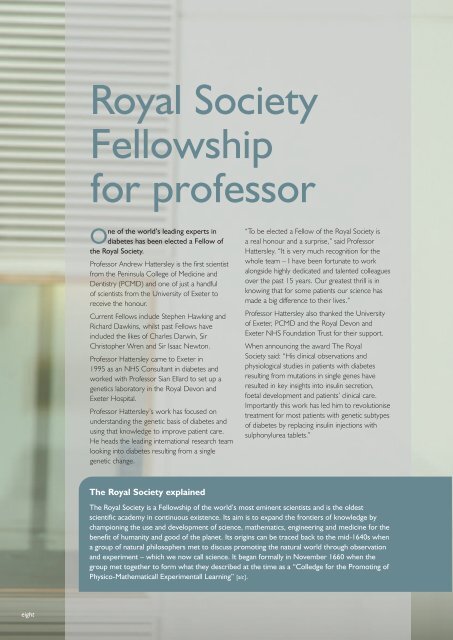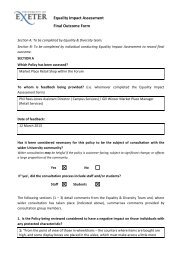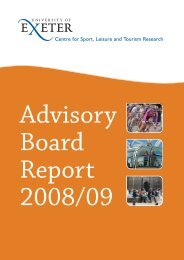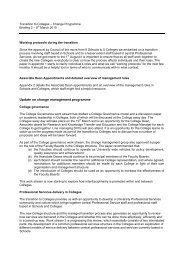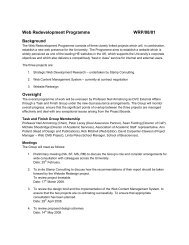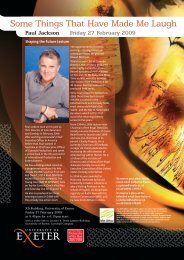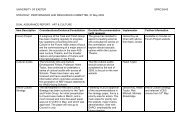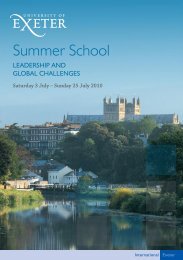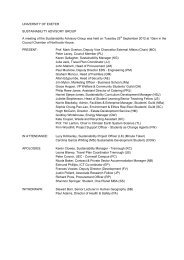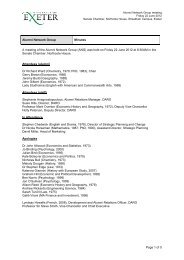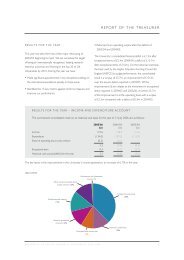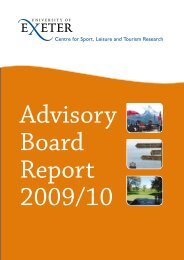UNIVERSITYNEWS - University of Exeter
UNIVERSITYNEWS - University of Exeter
UNIVERSITYNEWS - University of Exeter
You also want an ePaper? Increase the reach of your titles
YUMPU automatically turns print PDFs into web optimized ePapers that Google loves.
eight<br />
Royal Society<br />
Fellowship<br />
for pr<strong>of</strong>essor<br />
One <strong>of</strong> the world’s leading experts in<br />
diabetes has been elected a Fellow <strong>of</strong><br />
the Royal Society.<br />
Pr<strong>of</strong>essor Andrew Hattersley is the first scientist<br />
from the Peninsula College <strong>of</strong> Medicine and<br />
Dentistry (PCMD) and one <strong>of</strong> just a handful<br />
<strong>of</strong> scientists from the <strong>University</strong> <strong>of</strong> <strong>Exeter</strong> to<br />
receive the honour.<br />
Current Fellows include Stephen Hawking and<br />
Richard Dawkins, whilst past Fellows have<br />
included the likes <strong>of</strong> Charles Darwin, Sir<br />
Christopher Wren and Sir Isaac Newton.<br />
Pr<strong>of</strong>essor Hattersley came to <strong>Exeter</strong> in<br />
1995 as an NHS Consultant in diabetes and<br />
worked with Pr<strong>of</strong>essor Sian Ellard to set up a<br />
genetics laboratory in the Royal Devon and<br />
<strong>Exeter</strong> Hospital.<br />
Pr<strong>of</strong>essor Hattersley’s work has focused on<br />
understanding the genetic basis <strong>of</strong> diabetes and<br />
using that knowledge to improve patient care.<br />
He heads the leading international research team<br />
looking into diabetes resulting from a single<br />
genetic change.<br />
The Royal Society explained<br />
“To be elected a Fellow <strong>of</strong> the Royal Society is<br />
a real honour and a surprise,” said Pr<strong>of</strong>essor<br />
Hattersley. “It is very much recognition for the<br />
whole team – I have been fortunate to work<br />
alongside highly dedicated and talented colleagues<br />
over the past 15 years. Our greatest thrill is in<br />
knowing that for some patients our science has<br />
made a big difference to their lives.”<br />
Pr<strong>of</strong>essor Hattersley also thanked the <strong>University</strong><br />
<strong>of</strong> <strong>Exeter</strong>, PCMD and the Royal Devon and<br />
<strong>Exeter</strong> NHS Foundation Trust for their support.<br />
When announcing the award The Royal<br />
Society said: “His clinical observations and<br />
physiological studies in patients with diabetes<br />
resulting from mutations in single genes have<br />
resulted in key insights into insulin secretion,<br />
foetal development and patients’ clinical care.<br />
Importantly this work has led him to revolutionise<br />
treatment for most patients with genetic subtypes<br />
<strong>of</strong> diabetes by replacing insulin injections with<br />
sulphonylurea tablets.”<br />
The Royal Society is a Fellowship <strong>of</strong> the world’s most eminent scientists and is the oldest<br />
scientific academy in continuous existence. Its aim is to expand the frontiers <strong>of</strong> knowledge by<br />
championing the use and development <strong>of</strong> science, mathematics, engineering and medicine for the<br />
benefit <strong>of</strong> humanity and good <strong>of</strong> the planet. Its origins can be traced back to the mid-1640s when<br />
a group <strong>of</strong> natural philosophers met to discuss promoting the natural world through observation<br />
and experiment – which we now call science. It began formally in November 1660 when the<br />
group met together to form what they described at the time as a “Colledge for the Promoting <strong>of</strong><br />
Physico-Mathematicall Experimentall Learning” [sic].


